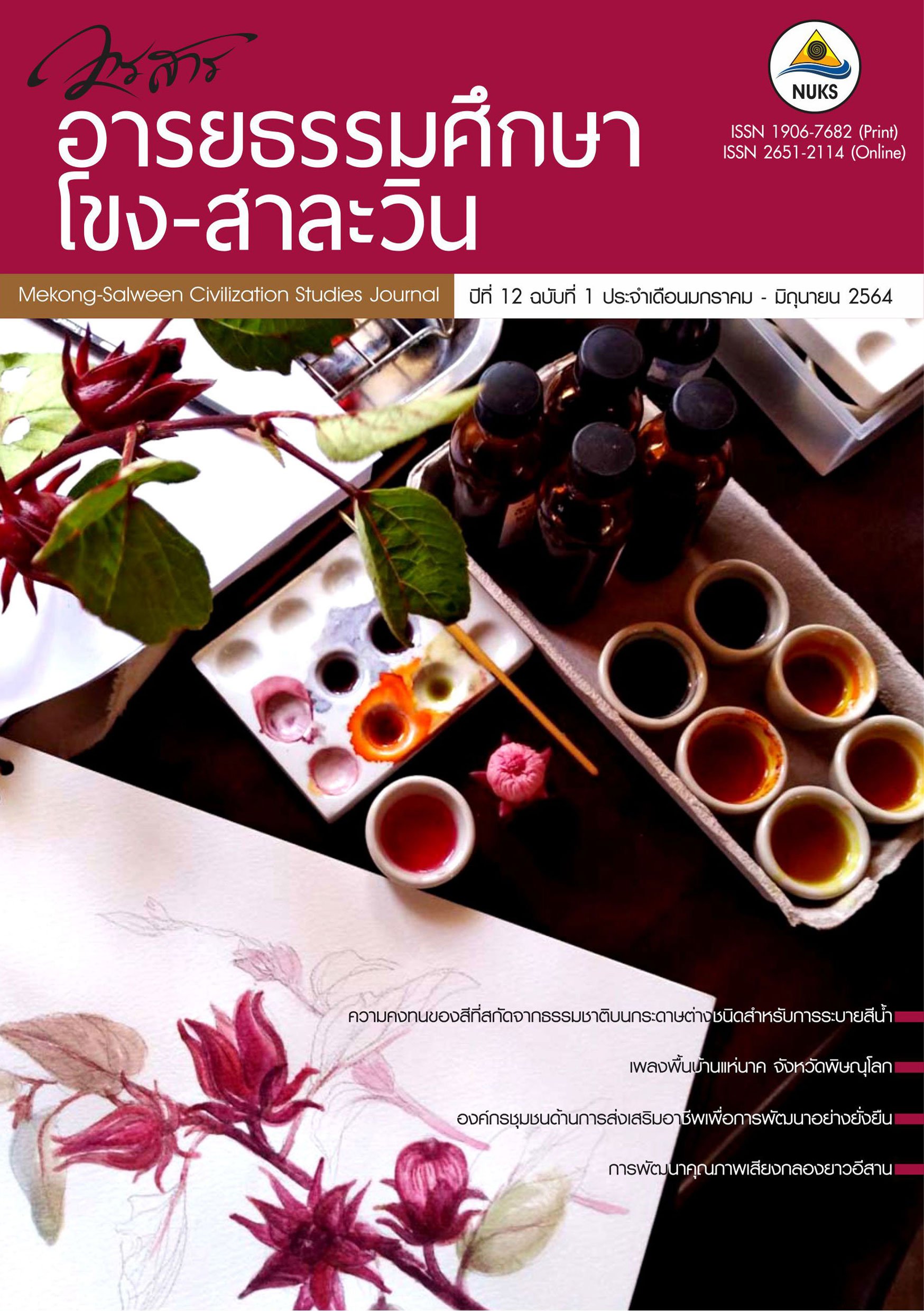Community Organizations for Occupational Promotion for Sustainable Development องค์กรชุมชนด้านการส่งเสริมอาชีพเพื่อการพัฒนาอย่างยั่งยืน
Main Article Content
Abstract
The aims of this research were as follows: 1) to compile the information concerning community organizations for occupational promotion in Thailand, 2) to analyze the types and the levels of community organizations, and 3) to synthesize success indicators and success test of community organizations within the area of occupational promotion for sustainable development. This research employed both qualitative and quantitative research methods. The data were from community organizations which were case studies selected by using purposive sampling. The main target population included 12 community organizations in Prachuab Khiri Khan Province. The minor target population included 30 community organizations across the country and were selected by purposive sampling. The results showed that the community organizations for occupational promotion in Thailand were individual organizations. Due to the differences of establishment, management administration, process, and concept of organizations, one organization's success model could not be used as an example for others. Regarding types and development levels, it was found that community organizations for occupational promotion in Thailand could be divided into 3 groups: 1) community organizations that were driven by business concept (capitalistic economic system), 2) community organizations that were driven by mixed concepts (intermediate economic system), and 3) community organizations that were driven by sacrificing concept (community economic system). The attitude of the 15 experts in area of the development of community organizations for occupational promotion concerning the existence and the guidance of mobilization of community organizations for occupational promotion for sustainable development was positive, and it was rated as a high to highest level. The basic concept of community organizations for occupational promotion for sustainable development was concluded that “No refusing capitalism, social and community acceptance, stabilizing life, being honor and proud, and using sustainable resources”.
Downloads
Article Details
References
Achavanuntakul, S. (2010). Capitalism is alive, business has heart. Bangkok: Matichon.Bradley JR., R. & Donway, R. (2010, Summer). Capitalism, Socialism, and “the Middle Way”. The Independent Review, 15(1), 71–87.
Charoenwongsak, K. (2000). Medium current economy : Direction of Thai Economy in the Future. Bangkok: Dansutthakanphim.
Chonchuapsong, L. (2014). Community way community business knowledge management. Bangkok: Chulalongkorn University Press.
Ganjanapan, A. (2006). Economic culture in an un-cultured economy. Bangkok: khopfai.
Julpongsathorn, S. (2007). Economic aspects of community based on rice mills in Thailand. Bangkok: Siam Publishing.
Kasemsuk, J. (2014). Public Participation Approach for Sustainable Community Development. Bangkok: Active print.
Muhammad, Y. (2019). A world of three zeros. (P. Pongpanit, Trans). Bangkok: Matichon.
Natsupha, C. (2001). Theory of two systems from the village history. Surindra: Surindra Rajabhat Institute.
Phongphit, S. (2007). How to do community Economic Life Plan. Bangkok: Charoen Wit Printing House.
Phothisita, C. (2013). Art and science of qualitative research. Bangkok: Amarin Printing and Publishing.
Prayukvong, W. (2020). Buddhist economics & entrepreneurship : foundation. Bangkok: Spy Publishing.
Rundgren, G. (2014). Garden Earth: From Hunter and Gatherer to Global Capitalism and Thereafter. (K. Deeprawat, C. Deeprawat, V. Phurithanasarn, & K. Natchananonthep, Trans.) Bangkok: Suan Nguen Mee Ma.
Satayanurak, A. (2016). From "farmer" to "entrepreneur" get better in financial status. Bangkok: Matichon.
Thiengnoi, T. & Sukprasert, P. (2014). Success Indicators Development for Career Promotion of Community Organization. Songklanakarin : Journal of Social Sciences & Humanities, 20(4), 241–271.
Uphoff, N. (1986). Local Institutional Development. Connecticut : Kumarian Press. Wetyasuporn, P. (2009, August 28). A Warning From Joseph Stiglitz. Komchadluek, p.11.


